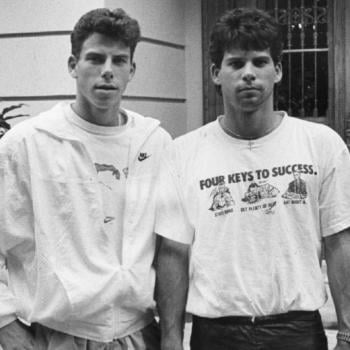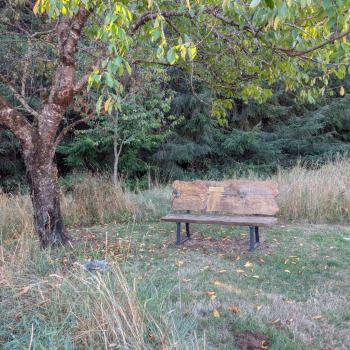J. Michael Shew had developed a brain tumor and been told he had six months to live. He really only had one and a half.
I felt sorry for J. Michael Shew. He seemed like a good man, and his story was as sad as stories get. But I did not know him.
"Let us pray," said the preacher. I watched as Roberto and Helena bowed their heads and clasped their hands. Most of the room did the same. I bowed my head as well, but I did not pray.
***
It was January as January should be: cold and rainy, Viking weather. But we were inside, and it was warm there, and it was only through the windows of the rec hall that we could see the gray clouds and the mist.
The building was an odd one: a long hall with a kitchen at one end and a stage at the other. The ceiling was made of wooden planks that slanted upward until they met in the center. It brought to mind old Germanic halls -- contaminated, perhaps, by the electric lights hanging from the ceiling and the glass windows in the walls. The feeling was there, nevertheless.
The event being held in that place was called Queen's Prize. It was an arts and sciences competition, and at first glance it looked like a flea market -- rows of tables piled on with dozens of displays. SCAdians had created these projects and brought them out to be judged. The Queen picked the winner -- hence the name of the event -- but everybody got something for their efforts.
Many of my college friends were there with projects. Esa brought an elaborate dress that had taken her a month and a half to sew, and Kasha had composed a piece of music. Helena was in the little kitchen cooking three courses to be judged in the food competition, and Roberto was there with her, though he had not submitted anything. I sat at a table near the stage with my tawny rune-covered staff and several copies of a long poem I had written, which I would perform during lunch.
The poem was called "Gangleri the Wanderer," and was based on a familiar story in Norse myths: a stranger appears at a chieftain's hall one night and dispenses knowledge and stories, and by the end is revealed as Odin, the lord of Asgard. I wrote it in the alliterative style of Old Norse, which was sometimes awkward in Modern English, and tried to cram as much of the knowledge I had gained about old Germanic languages at school into it. It was the first thing I had ever written for the SCA.
When lunchtime came around, I and about five others were called up before the king and queen to perform our pieces. One recited, with much aplomb, about five minutes of selections from Beowulf in the original Old English to a crowd who mostly did not understand Old English; another, a girl I later discovered was thirteen years old, played a beautiful song on an Anglo-Saxon harp she had built with her mother's help. And then I stepped up, with my rune-staff and my Thor's Hammer and my poem, and I did my best.
Once in this world, there walked many wonders,
marvelous monsters, and men who earned honor.
But oft have I heard of the old gods . . .
I wrote that poem for the competition, yes, but I had other reasons, too. Earlier that year I had gotten into a religion called Asatru, which was based off reconstructing the religion of the Old Norse and Icelanders. I wouldn't say I "converted" to Asatru; conversion has always sounded very restricting to me, something for the monotheists to worry about. I had adapted it into my own beliefs, and found myself thinking about Odin and Thor and Freyja daily, trying to figure out how these new and powerful presences worked into my consciousness. I wrote the poem for them, to express what I felt made them so appealing to me: their flaws, their failures, their pain. Their humanity.
And eventually, after Gangleri the Wanderer had told the story of the world's birth and the world's end, the chieftain asked him why he had come to them, and this was what I said in his voice:
Allfather knows all that arises in Midgard
from his high seat in Valhalla he sees
all things that are or ever will be.
Yet Allfather is maimed like those in Midgard.
The gods know grief for their brother Baldr
who left the light-lands never to return.
The plight and pangs of middle-earth men
belong to the Aesir and the Allfather.
But the gods also know that glory is gained
by men who live well and defy their doom
through their great deeds of courage and kindness.
Death comes to all who walk the worlds;
in the fate of man and god there is no shame.
In the end all things pass into the black;
shipped out unguided into the silent sea.
What shore we reach is known by no man.
What matters in life is the way that we live it.




